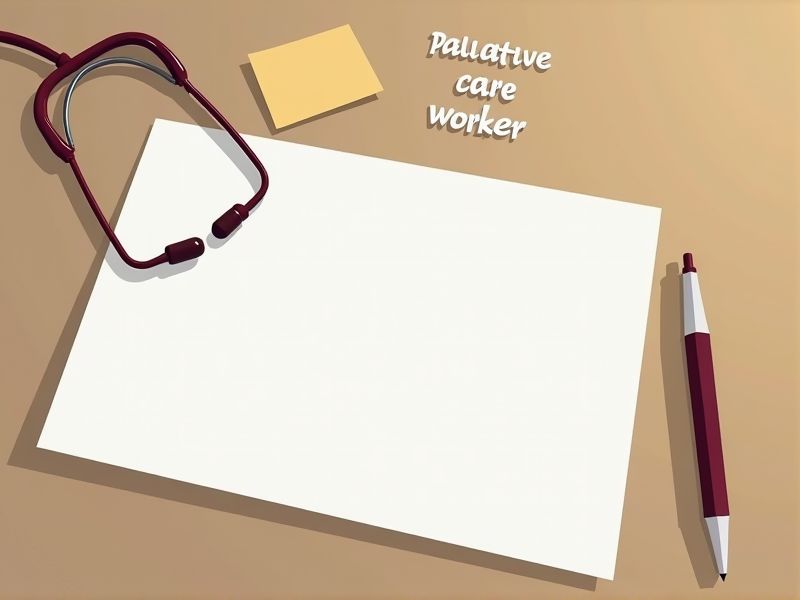
Palliative care workers engage with patients requiring comprehensive attention, making certain certifications essential. These credentials ensure that caregivers possess the necessary skills to manage complex medical and emotional needs effectively. Certifications validate a worker's ability to deliver compassionate and skilled care while adhering to best practices and ethical standards. Here are some important certifications you may need as a palliative care worker.
Board Certification in Hospice and Palliative Medicine
Board certification in Hospice and Palliative Medicine validates a healthcare professional's expertise in compassionate end-of-life care, ensuring they meet high industry standards. Certification enhances a worker's credibility, providing reassurance to patients and families about the quality of care delivered. It encourages the ongoing education and skill development necessary to stay current with evolving best practices. Medical professionals with board certification are more likely to effectively communicate and collaborate within interdisciplinary teams, improving patient outcomes.
Certified Hospice and Palliative Care Nurse (CHPCN)
The need for a Certified Hospice and Palliative Care Nurse (CHPCN) arises from the increasing prevalence of chronic and life-limiting illnesses, which demand specialized care approaches. Certification ensures that nurses possess the necessary skills and knowledge to effectively manage complex symptoms and provide emotional support. The certification validates the ability to adhere to best practices and ethical standards critical for end-of-life care. Employers and patients benefit from the assurance of quality that a certified nurse brings to palliative care teams, leading to improved patient outcomes.
Hospice and Palliative Care Certification (HPCC)
Hospice and Palliative Care Certification ensures that palliative care workers possess the specialized knowledge necessary to address the complex medical and emotional needs of patients facing serious illnesses. The certification process validates a professional's competence in symptom management, thus enhancing the quality of care delivered. Being certified can lead to increased trust from patients and their families, who often seek assurance in the caregiver's expertise. Certification may offer career advancement opportunities, as it distinguishes certified workers as leaders in the palliative care field.
Certified Hospice and Palliative Care Administrator (CHPCA)
Certified Hospice and Palliative Care Administrator (CHPCA) provides specialized training that enhances the care quality and coordination in palliative settings. This certification ensures that administrators are equipped with the latest knowledge and best practices in managing end-of-life care. With CHPCA certification, administrators gain the skills necessary to efficiently allocate resources and manage teams in palliative care environments. Regulatory compliance and policy understanding are strengthened, leading to improved patient care standards and outcomes.
Certified Hospice and Palliative Care Social Worker (CHPCSW)
A Certified Hospice and Palliative Care Social Worker (CHPCSW) is needed because they possess specialized training that enhances the emotional and psychological support provided to patients and families. Their expertise in navigating complex healthcare systems improves access to necessary resources and services, including financial assistance and community support. They are skilled in facilitating communication between patients, families, and healthcare teams, ensuring that care is aligned with the patient's values and wishes. Their involvement in developing comprehensive care plans ensures a holistic approach to end-of-life care, promoting quality of life and dignity.
Advanced Cardiovascular Life Support (ACLS)
Advanced Cardiovascular Life Support (ACLS) equips palliative care workers with skills to manage acute cardiac emergencies, enhancing patient safety. In palliative settings, timely intervention can alleviate symptoms, preventing patient distress. Knowledge in ACLS allows palliative workers to work effectively alongside medical teams, ensuring coordinated care. Understanding ACLS protocols enhances decision-making, leading to improved quality of life outcomes for patients.
Basic Life Support (BLS)
Basic Life Support (BLS) training equips palliative care workers with skills to manage acute medical emergencies, which can significantly improve patient outcomes. Understanding BLS protocols ensures quick and effective action in critical moments, potentially stabilizing a patient's condition before advanced medical help arrives. This training fosters confidence in healthcare workers, enhancing their ability to provide comprehensive care even under stressful situations. BLS knowledge supports a holistic approach to patient care, aligning with the principles of patient safety and quality in palliative care settings.
Certified Bereavement Counselor
The presence of a Certified Bereavement Counselor ensures emotional support for patients and their families during end-of-life stages, addressing the complex grief that often accompanies terminal diagnoses. Palliative care workers often face the emotional impact of patient loss, and certified counselors can provide the necessary tools and strategies to manage these feelings effectively. Grief counseling expertise enhances communication between healthcare providers and families, facilitating a more compassionate and understanding care environment. In cases of anticipated death, bereavement counselors assist in preparing families emotionally, leading to a healthier grieving process after the patient's passing.
Certified Pain Educator
Certified Pain Educators provide specialized knowledge on pain management techniques, enhancing the ability of palliative care workers to address complex pain scenarios. Their expertise ensures that patients receive evidence-based interventions, improving overall comfort and quality of life. By integrating advanced education, palliative care workers can tailor treatment plans more effectively, reducing suffering and anxiety in patients. Informed staff contribute to multidisciplinary teams, fostering collaborative environments that prioritize patient-centered care.
End-of-Life Doula Certification
Obtaining an End-of-Life Doula Certification enhances a palliative care worker's ability to provide emotional and practical support to patients and their families during the dying process. This certification provides them with specialized skills in communication, vigil planning, and personalized care, which are crucial for addressing complex end-of-life needs. Understanding the nuances of the dying process through this training can improve patient satisfaction and reduce stress for all parties involved. The integration of doula principles into palliative care practices builds a more comprehensive care approach, fostering a holistic environment for end-of-life care.
Summary
You enhance the quality of care by gaining certifications, leading to improved patient outcomes and satisfaction. Your expertise fosters trust among patients and families, encouraging more open communication and collaboration. With certifications, you may access increased job opportunities and potential salary growth within the healthcare field. Your specialized skills also contribute to a more supportive work environment, benefiting the entire care team.
